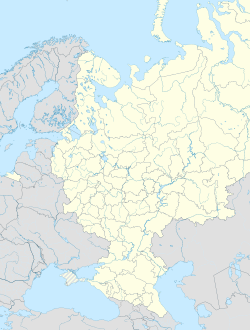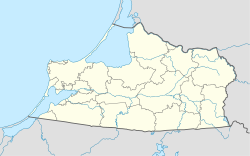Tchaikovskoye
| settlement
Tschaikowskoje /
Lugowen (Großlugau) Чайковское
|
||||||||||||||||||||||
|
||||||||||||||||||||||
|
||||||||||||||||||||||
Tschaikowskoje ( Russian Чайковское , scientific. Transliteration Čajkovskoe , German Lugowen , from 1938 to 1945 Großlugau , lithuanian Lugava , including: lithuanian Lygawa ) is a place in the Russian Kaliningrad Oblast (region Königsberg (Prussia) ) and is located in the north-east of the Pravdinsky District ( Friedland district (Ostpr.) ). Tschaikowskoje is a village within the Mosyrskoje selskoje posselenije (rural community Mosyr (Klein Gnie) ).
Geographical location
Tschaikowskoje located on the Borodinka ( Russian Бородинка , Ilme ' ), 28 kilometers southwest of the erstwhile district town Chernyakhovsk (Insterburg) and 38 kilometers northeast of the current Rajonshauptstadt Pravdinsk (Friedland (East Prussia.)) On a side road that Sadowoje ( Szallgirren / Schallgirren , 1938 –1945 Kreuzhausen ) on the Russian trunk road A 197 (former German Reichsstrasse 139 ) with Perewalowo ( Muldszen / Muldschen , 1938–1945 Mulden ) on the trunk road R 508 .
Until 2001 there was a railway connection to the Toruń – Tschernjachowsk (Thorn – Insterburg) line via the Frunsenskoje station (until 1947: Bokellen ) , the section of which is no longer in operation on Russian territory.
history
Until 1945, the former Gutsdorf Lugowen or Großlugau was a municipality to which the districts of Alt Lenkutschen, Nendrinn (1938–1945 Altlugau , since 1950: Iwanowka), New Lenkutschen and Warlin (Russian: Sowjetskoje) belonged. In 1874, Lugowen became the administrative seat and eponymous place for the administrative district of Lugowen, to which three villages belonged at the time and which was located in the district of Insterburg in the Gumbinnen district in the Prussian province of East Prussia .
In 1910 there were 367 people in Lugowen.
On September 30, 1928, the Lugowen manor district was incorporated into the Draskinehlen rural community (1938–1945 Neulugau ) and thus into the Jodlauken district (1938–1945 Schwalbental , since 1947: Wolodarowka) and lost the status of the official village. But not for long: just two years later, Lugowen became independent again and returned to the now re-established administrative district of Lugowen - together with the rural community of Gravenort (Russian: Repino), which was also anchored in the administrative district of Jodlauken.
In 1933 Lugowen had 476 inhabitants, the number of which had changed to 414 by 1939. On June 3, 1938 (with official confirmation of July 16, 1938) Lugowen was renamed Großlugau .
After the place came to the Soviet Union in 1945 with the whole of northern East Prussia , it was given the new name Tchaikovsky in 1950 after the Russian composer Pyotr Ilyich Tchaikovsky . Tchaikovskoye was incorporated into the Frunzensky Soviet (Dorfsovjet Frunzenskoje (Bokellen) ) until 2009 and has since - due to structural and administrative reform - been classified as a “settlement” (possjolok) within the Mosyrskoje selskoje posselenije (rural community Mosyr (Klein Gnie ) ).
District Lugowen / Großlugau
On March 11, 1874, the district of Lugowen was established in the district of Insterburg in the administrative district of Gumbinnen within the Prussian province of East Prussia , which was formed by the communities:
| Name (until 1945/1950) | Name (after 1950) | Remarks |
|---|---|---|
| Rural communities : | ||
| Old steering chutes | - | 1875 incorporated into the Lugowen manor district |
| New steering slides | - | incorporated into the Lugowen manor district at an unknown date |
| Manor : | ||
| Lugowen 1938–1945: Großlugau |
Tchaikovskoye | between 1928 and 1930 temporarily incorporated into the rural community of Draskinehlen |
The district of Lugowen was dissolved between 1928 and 1930, then arose again and comprised the two rural communities Lugowen (Großlugau) and Gravenort (Russian: Repino) until 1945, from 1938 onwards with the renaming as "District of Großlugau".
church
The predominantly Protestant population of Lugowens and Großlugau was parish until 1945 in the parish of Jodlauken (1938–1945 Schwalbental , from 1947: Wolodarowka). It belonged to the church district Insterburg (Russian: Tschernjachowsk) within the church province of East Prussia of the Church of the Old Prussian Union . The last German clergyman was Pastor Theodor Eicke .
Today Tchaikovskoye is located in the catchment area of the Protestant community in the city of Insterburg (Tschernjachowsk), which was newly formed in the 1990s, and which belongs to the newly established Kaliningrad provost of the Evangelical Lutheran Church of European Russia (ELCER).
Personalities of the place
Born in the place
- Richard von Below (1833–1875), politician, member of the Prussian manor house
- Gerd von Below (1838-1892), Lieutenant General
Connected to the place
- Georg Graf von Lehndorff (1833-1914), racehorse breeder and racing rider, spent a large part of his childhood in Lugowen
Individual evidence
- ↑ Itogi Vserossijskoj perepisi naselenija 2010 goda. Kaliningradskaya oblastʹ. (Results of the 2010 all-Russian census. Kaliningrad Oblast.) Volume 1 , Table 4 (Download from the website of the Kaliningrad Oblast Territorial Organ of the Federal Service for State Statistics of the Russian Federation)
- ↑ a b Rolf Jehke: Großlugau district. In: territorial.de. Retrieved May 24, 2019 .
- ↑ Uli Schubert: Welcome to Gemeindeververzeichnis.de. In: ulischubert.de. Retrieved May 24, 2019 .
- ↑ Michael Rademacher: German administrative history from the unification of the empire in 1871 to the reunification in 1990. City and district of Insterburg (Russian Chernyachovsk). (Online material for the dissertation, Osnabrück 2006).
- ↑ The Указ Президиума Верховного Совета РСФСР от 5 июля 1950 г., №745 / 3, "О переименовании населённых пунктов Калининградской области» (Regulation 745/3 of the Presidium of the Supreme Soviet of the RSFSR over the renaming of places in the Kaliningrad region of 5 July 1950)
- ↑ According to the Law on the Composition and Territories of Municipal Forms of the Kaliningrad Oblast of June 25th / 1. July 2009, along with Law No. 476 of December 21, 2004, specified by Law No. 379 of July 1, 2009
- ↑ Лютеранская церковь в Калининграде. In: propstei-klg.com. Retrieved May 24, 2019 (Russian).
- ^ Evangelical Lutheran Provost Kaliningrad / Königsberg. (No longer available online.) In: www.propstei-kaliningrad.info. Archived from the original on February 1, 2017 ; accessed on May 24, 2019 .

